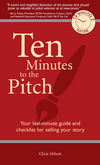TV Writer Paul Guyot tells all about the demise of his TNT pilot THE DARK, which he wrote and produced with Stephen J. Cannell and that was directed by Walter Hill. So what went wrong?
Who knows what happened – you can speculate and Monday morning
quarterback forever – but the bottom line was once the thing was shot,
edited and presented to the network, the original script and story just
wasn’t there. The first thing the network said when they saw the cut was "Where’s the script we bought?"Now, I’m not saying it was awful. I don’t love the finished product,
but I will say that, overall, I’m happy with about 70% of it. These
days that’s not a bad percentage. But it was that other third that
killed us.
A few years ago, we shot a two-hour, back-door pilot on DIAGNOSIS MURDER starring Fred Dryer as the Chief of Police of Los Angeles. The co-star was an unknown actor named Neal McDonough, who has since gone on to star in BAND OF BROTHERS, BOOMTOWN and MEDICAL INVESTIGATIONS (as well as a three-episode arc on MARTIAL LAW for us). The pilot was called THE CHIEF.
Since DIAGNOSIS MURDER was, itself, a spin-off of JAKE AND THE FATMAN (which itself was a spin-off of MATLOCK), Fred Silverman demanded that we do at least one pilot per season imbedded in an episode of the show.
 This is a cheap way to make a pilot and allows the studio an opportunity to recoup their costs in syndication. You also go straight to film without all the intermediate steps in the development process. The other advantage is that the pilot will air and the ratings, if they are high enough, can be a valuable sales tool.
This is a cheap way to make a pilot and allows the studio an opportunity to recoup their costs in syndication. You also go straight to film without all the intermediate steps in the development process. The other advantage is that the pilot will air and the ratings, if they are high enough, can be a valuable sales tool.
The downside is that backdoor pilots-as-episodes have a much harder time being taken seriously at the network because they usually aren’t developed through the usual channels and, therefore, there’s no one championing them internally at the network. (Of course lots of pilot-as-episodes have sold… CSI:MIAMI and MORK AND MINDY are a few such examples, my book UNSOLD TELEVISION PILOTS is littered with others that haven’t, like ASSIGNMENT EARTH from STAR TREK and LUTHOR GILLIS form MAGNUM PI)
THE CHIEF had a lot going for it. For one thing, we had Fred Dryer, a proven star with HUNTER and this role was absolutely perfect for him (and I have to say, he was great in it). For another, the two-hour pilot aired during sweeps and got fantastic ratings, ranking something like #14 for the week, a tremendous accomplishment for us. And finally, we tested the show with audiences at ASI and the scores were amazing, among the best our partner Fred Silverman (former head of ABC, CBS and NBC) had ever seen. We were sure we had a slam-dunk sale at CBS…and if they were foolish enough to pass on it, we definitely land at another next network. Little did we know…
We met with Les Moonves at CBS…and he passed. He didn’t want to work with Fred Dryer. We met with Jaime Tarses at ABC. She didn’t want to work with Dryer. We met with Dean Valentine at UPN. He didn’t want to work with Dryer. And so it went at every network. What killed us wasn’t the execution, the concept, the acting, the ratings, or the testing. What killed us was bad blood between Dryer and execs he’d worked with before on other projects. Basically, we were victims of the burned bridges Dryer had left in his wake. The television audience loved Fred Dryer, but the major network execs didn’t. Had we known that going in, we would have cast someone else as THE CHIEF. Then again, we might not have enjoyed the same terrific ratings and sky-high testing…not that they did us any good in the end. (Ironically, CBS ended up doing a similar show with Craig T. Nelson
called THE DISTRICT. And from what I hear, Nelson was no picnic)
I’ve since had another experience like that with another star which is why, from now on, we call around about the actors we’re thinking about working with so we aren’t derailed from the get-go by burned bridges or a history of "difficult behavior on the set.
(You can read the two-part pilot script here and here or watch a five minute sales presentation culled from the two-hour movie here, just go to THE CHIEF logo and click on it).








